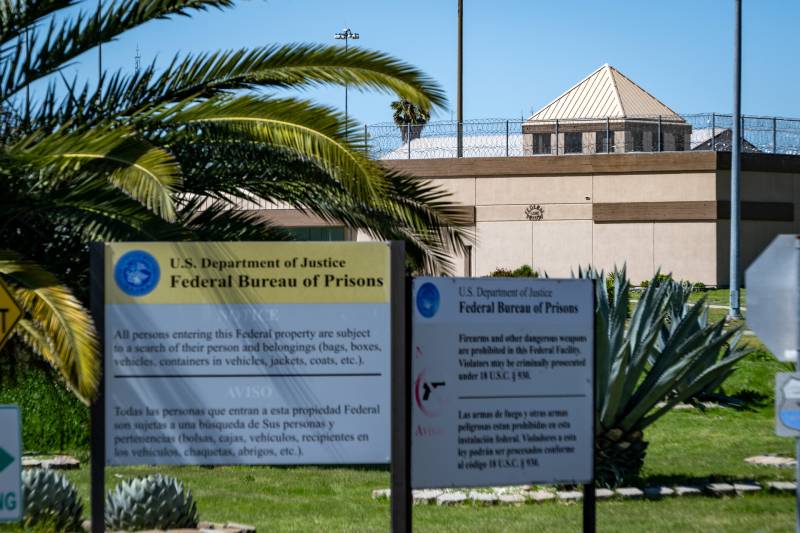Within hours of the announcement, U.S. District Judge Yvonne Gonzalez Rogers issued an order requiring prison officials to update casework for all inmates to ensure they are sent to the correct location — another BOP facility, home confinement or a halfway house, or if they should be granted compassionate release. “The result of these case reviews and transfer designations shall be reviewed with the Special Master prior to transfer,” the order reads. Another document detailing additional guidance to BOP on the transfers was filed under seal.
In the Tuesday brief, government attorneys wrote that the special master, Wendy Still, had told FCI Dublin’s interim warden, Nancy McKinney, that she interpreted the court’s order as authorizing her to have each incarcerated person medically reviewed by her staff and a BOP doctor before approving the transfer. “These procedures — above what BOP requires — are significantly delaying the transfer process,” attorneys wrote, arguing that the court does not have the authority to decide when inmates in its custody should be transferred.
“It is beyond question that transfer of inmates falls within the exclusive authority of the BOP, and it is not subject to judicial review,” the brief reads.
How many people have been transferred so far? It’s unclear. A BOP spokesperson declined to comment beyond Peters’ initial statement on the closure — which said the timing of transfers would not be shared — citing “safety and security reasons.”
In an interview with KQED on Tuesday, an incarcerated woman described a chaotic scene at the prison as officials attempted to transfer roughly 600 or so people.
Ashley Castillo said she and other prisoners learned about the closure on Monday morning through news reports. They were subsequently told 100 people would be transferred per day, with the first group of prisoners — including Castillo — leaving that same day. As the women were given a green bag to fill with their belongings, they noticed officers from other BOP facilities had replaced the prison’s usual staff, Castillo said. Some women got on a bus to leave but ultimately returned to the prison, she added.
“They packed people out and they even dressed them out, and they let them board the bus,” Castillo said. “And then at the end, like around three o’clock, they brought them back. They dressed them out again, gave them their uniforms again, and they said you guys are not going nowhere.”
Still, who Gonzalez Rogers appointed barely a week and a half ago, and is tasked with overseeing a series of reforms at FCI Dublin, was at the prison on Monday and Tuesday communicating with prisoners, according to Castillo.
“We were all going crazy not knowing what was going on. [Still] said, ‘Don’t worry, I’m talking to the judge right now, and I’m trying to put a stop to it because you guys are not medically cleared to go anywhere,’” Castillo recalled, adding that the uncertainty of the announcement had created confusion and distress among women at the prison who were frantically trying to get ahold of their families.
The latest: Two hearings were held this morning that were closed to the public. Shortly after, Gonzalez Rogers issued another order, under seal, with further guidance on the transfers. Attorneys representing women in the class-action lawsuit did not respond to a request for comment on hearings held this morning.
Castillo’s attorney, Alana McMains, told KQED she received emails from both of her clients at FCI Dublin saying they expected to be transferred on Wednesday.
“I have no idea if they actually got a chance to meet the special master and inquire about compassionate release,” McMains said.
How did we get here?: In March, FBI agents raided FCI Dublin. BOP announced it was replacing core members of the prison’s leadership staff hours later.
- Several days later, Gonzalez Rogers ordered the appointment of a special master, an independent third party, to oversee immediate changes at the facility.
- Still, the former chief probation officer for Alameda and San Francisco counties was appointed special master on April 5. Still and her staff were given full access to the prison and its records.
- According to an attorney representing incarcerated women in a class action lawsuit, Still was at FCI Dublin the following April 8 and at least one other time that week.
- On April 15, BOP announced it was closing FCI Dublin.
What’s next: On Thursday, Darrell Wayne Smith, the last FCI Dublin officer facing criminal charges for alleged sex abuse, is scheduled for a status conference.
Smith was arrested in May 2023 and charged with five counts of sexual abuse of a prisoner, six counts of abusive sexual contact and one count of aggravated sexual abuse. An indictment describes 12 incidents between May 2019 and May 2021, during which Smith allegedly had sexual contact with three women incarcerated at the prison.

